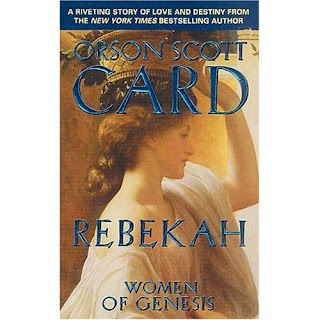Jacob flees Canaan, falls asleep in the desert and has a trippy dreamKnowing that Esau is planning to kill Jacob, their mother Rebekah convinces Isaac that Canaanite women are not good enough for Jacob to marry. She wants her favorite son to marry a woman from her old home turf of Paddan Aram. Isaac obligingly sends Jacob on his way.
It seems that Isaac has had some time to cool off from the fiasco of the previous chapter. He tells Jacob to go forth, find a wife, multiply, and pass along Abraham's blessing to his descendants (the blessing, remember, that Jacob swindled from his brother).
All this fuss about Jacob not marrying a local Canaanite woman makes Esau think that maybe he shouldn't either. After Jacob leaves town, Esau goes out and marries a daughter of Ishmael.
Meanwhile, while Jacob is out traveling in the middle of nowhere, he tires and falls asleep. He has a dream where he sees a ladder (or stairway) connecting Earth to Heaven, with angels ascending and descending the ladder (or stairway). God is at the top of the ladder (or, you get the drill) up in Heaven where he speaks to Jacob, giving him the same basic spiel he gave Abraham - I am your God, you will be blessed through me, the number of your descendants will be like the dust of the Earth, yada yada yada.
In the morning, Jacob awakes with a new perspective and sense of purpose. Jacob realizes that the place around him is the house of God and a gate to Heaven, and so names it "Bethel", meaning "House of God". By the way, you can still visit this place; nowadays the city is called Beitin, and it's in the West Bank.
Jacob also declares the Lord to be his God, this being the first time we see him openly accept God.
---
Now, I'd appreciate it if you'll indulge me a tangent that addresses something that's been on my mind recently, which I hope to circle back and dovetail into the story of Jacob I've just summarized.
I just finished reading a book by Kurt Vonnegut called "Breakfast of Champions", where he wrote: "Her name was Cynthia Anne, and she certainly didn't live very long until she was made dead again."
After reading this line, I paused. There was something about the phrasing of that last part: "dead again". The "again" of course being the artistry of the line, the bit that anyone except Vonnegut would have left out. Here, Vonnegut is implying that one can be "dead before", or "dead previously". And I found myself immensely relieved by that thought. That one doesn't just "die". One "dies again".
Because, I don't know about you, but to me death is truly scary. Probably the scariest thing there is because it is completely unknowable to the living, and honestly, I'm sure that that feeling of uncertain dread is in part what is driving this blog.
But I have to remind myself that I haven't always been here, on Earth, in my body. I came from nothing (or, I suppose if you believe in God, something) and am just passing through on my way back to nothing (or something). Is this making sense? Whatever death is, we've been there before.
Maybe death is like being taken to a house from your childhood that you don't remember living in. You wouldn't be able to recall the color of the paint on the inside walls, or whether it had a fireplace, or a pool, or if the grass were green or brown. The only thing you would know, and in effect, the only thing you could really take comfort in, is the fact that you've been there before. It's where you came from.
So, maybe this feeling I had of connection with the great beyond is a little like what Jacob was feeling while he was in that dream, seeing this tangible thing that tied Heaven to Earth. Jacob's ladder is a reminder that death is the thing that will bridge us from this world to the next.








